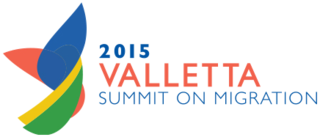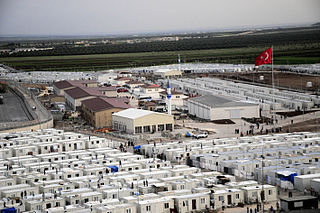Related Research Articles
African immigrants in Europe are individuals residing in Europe who were born in Africa. This includes both individuals born in North Africa and Sub-Saharan Africa.

In 2021, Istat estimated that 5,171,894 foreign citizens lived in Italy, representing about 8.7% of the total population. These figures include naturalized foreign-born residents as well as illegal immigrants, the so-called clandestini, whose numbers, difficult to determine, are thought to be at least 670,000.

The European Union Agency for Asylum (EUAA) is an agency created by European Union Regulation 439/2010 within the area of freedom, security and justice framework to increase the cooperation of EU member states on asylum, improve the implementation of the Common European Asylum System, and support member states under pressure.

The 2015 European migrant crisis was a period of significantly increased movement of refugees and migrants into Europe, namely from the Middle East. An estimated 1.3 million people came to the continent to request asylum, the most in a single year since World War II. They were mostly Syrians, but also included a significant number of people from Afghanistan, Pakistan, Iraq, Nigeria, Eritrea, and the Balkans. The increase in asylum seekers has been attributed to factors such as the escalation of various wars in the Middle East and ISIL's territorial and military dominance in the region due to the Arab Winter, as well as Lebanon, Jordan, and Egypt ceasing to accept Syrian asylum seekers.

Operation Triton was an operation conducted by Frontex, the European Union's border security agency. The operation, under Italian control, began on 1 November 2014 and ended on 1 February 2018 when it was replaced by Operation Themis. It involved voluntary contributions from 15 other European nations. Voluntary contributors to Operation Triton included Croatia, Iceland, Finland, Norway, Sweden, Germany, the Netherlands, France, Spain, Portugal, Austria, Switzerland, Romania, Poland, Lithuania and Malta. The operation was undertaken after Italy ended Operation Mare Nostrum, which had become politically unpopular and costed the Italian government €9 million per month for an operation that lasted 12 months. The Italian government had requested support from the other EU member states, but the request was declined.

Operation Sophia, formally European Union Naval Force Mediterranean, was a military operation of the European Union that was established as a consequence of the April 2015 Libya migrant shipwrecks with the aim of neutralising established refugee smuggling routes in the Mediterranean. The operational headquarters was located in Rome. The EU mandate for the operation ended on March 31, 2020. Operation Irini is the successor operation.

A migrant crisis is a difficult or dangerous situation that arises due to the movements of large groups of immigrants in the receiving state. Migrants are often escaping from conditions which negatively affected them in the country of origin (departure). The "crisis" is not the amount of refugees, but the system's failure to respond in an orderly way to the government's legal obligations towards them. Some notable crises are; European migrant crisis, English Channel migrant crisis and World War II evacuation and expulsion.

The Valletta Summit on Migration, also called the Valletta Conference on Migration, was a summit held in Valletta, Malta, on 11–12 November 2015, in which European and African leaders discussed the European migrant crisis. The summit resulted in the EU setting up an Emergency Trust Fund to promote development in Africa, in return for African countries to help out in the crisis.

This is a timeline of the European migrant crisis of 2015 and 2016.

Proactiva Open Arms (POA) is a Spanish NGO devoted to search and rescue (SAR) at sea. Set up in October 2015, it carried out its first rescue action that same month from its base on the Greek island of Lesbos. As well as maintaining a permanent base on Lesbos, the NGO carries out its rescue operations from three ships, a sailing yacht Astral, the Golfo Azzurro and Open Arms.

Libya–European Union relations are the foreign relations between the country of Libya and the European Union.
Events in the year 2017 in Malta.
Immigration to Malta has increased significantly over the past decade. In 2011, immigration contributed to 4.9% of the total population of the Maltese islands in 2011, i.e. 20,289 persons of non-Maltese citizenship, of whom 643 were born in Malta. In 2011, most of migrants in Malta were EU citizens, predominantly from the United Kingdom.
The Khartoum Process is a platform for political cooperation amongst the countries along the migration route between the Horn of Africa and Europe. It was set up at a ministerial conference on 28 November 2014 in Rome, Italy.

The Turkish migrant crisis, sometimes referred to as the Turkish refugee crisis, was a period during the 2010s characterised by a high number of people migrating to Turkey. Turkey received the highest number of registered refugees of any country or territory each year from 2014 to 2019, and had the world's largest refugee population according to the United Nations High Commissioner for Refugees (UNHCR). The majority were refugees of the Syrian Civil War, numbering 3.6 million as of June 2020. In 2018, the UNHCR reported that Turkey hosted 63.4% of all "registered Syrian refugees."
The migration and asylum policy of the European Union is within the area of freedom, security and justice, established to develop and harmonise principles and measures used by member countries of the European Union to regulate migration processes and to manage issues concerning asylum and refugee status in the European Union.

According to the United Nations, human smuggling is defined as "the procurement, in order to obtain, directly or indirectly, a financial or other material benefit, of the illegal entry of a person into a State Party of which the person is not a national or a permanent resident." While flows of migration have come and gone throughout history, current numbers surrounding human movement are unprecedented. Geographic, economic, and demographic factors create distinct migration patterns and routes over time. In 2020, there were 281 million international migrants across the globe, making up 3.6% of the global population. Though this is a small percentage of the total population, the number of individuals residing in states outside of where they were born has more than tripled since 1970. Looking at the most recent migration events in the Mediterranean, crossing the sea has been a primary method smugglers use to enter migrants into Europe. Since the 2015 Migration Crisis, the Central Mediterranean region has been declared the deadliest migration route in the world. Nearly 28,000 irregular migrants have arrived in Europe in 2024, with over 11,000 crossing the Mediterranean Sea in the process.
Externalization describes the efforts of wealthy, developed countries to prevent asylum seekers and other migrants from reaching their borders, often by enlisting third countries or private entities, including criminal groups. Externalization is used by Australia, Canada, the United States, the European Union and the United Kingdom. Although less visible than physical barriers at international borders, externalization controls or restricts mobility in ways that are out of sight and far from the country's border. Examples include visa restrictions, sanctions for carriers that transport asylum seekers, and agreements with source and transit countries. Consequences often include increased irregular migration, human smuggling, and border deaths.
The European Union response to the 2015 migrant crisis focused on how the countries organized the efforts in response to the 2015 European migrant crisis at the EU level. The European Commission in May 2015 proposed distributing the incoming refugees based on GDP and population. This proposal was divisive with Slovakia, Hungary, Romania and the Czech Republic refusing any refugees. Some nation states then called on the EU to reduce funding for member countries who did not want to share burdens and didn't share "values...need to start asking themselves questions about their place in the European Union". This attempt to coalition build failed, the European Commission proceeded to strengthen existing systems such as the Common European Asylum System (CEAS), reforming the Dublin Regulation and centralizing the asylum process. There was also challenges to the European borders which came from the Mediterranean Sea; as a response the European Border and Coast Guard Agency engaged in a new operation called Operation Triton.
References
- 1 2 "Informal meeting of EU heads of state or government, 03/02/2017 - Consilium". www.consilium.europa.eu. Retrieved 4 February 2017.
- 1 2 Kanter, James (3 February 2017). "E.U. Vows to Slow Migration on Sea Route That Claimed Thousands of Lives". The New York Times. Retrieved 4 February 2017.
- 1 2 "EU leaders in Malta, hoping to curb African migration". Reuters. 3 February 2017. Retrieved 4 February 2017.
- ↑ "EU Leaders Step Up Libya Aid to Stem Migrant Flow to Europe". Bloomberg. 3 February 2017. Retrieved 4 February 2017.
- ↑ "Migrant crisis: EU leaders agree plan to stop Libya influx". BBC News. 3 February 2017. Retrieved 4 February 2017.
- ↑ "EU leaders hammer out Libya plan at Malta summit". Times of Malta. 3 February 2017. Retrieved 4 February 2017.
- ↑ "EU summit: Malta to prepare migration measures roadmap - draft declaration". Times of Malta. 2 February 2017. Retrieved 4 February 2017.